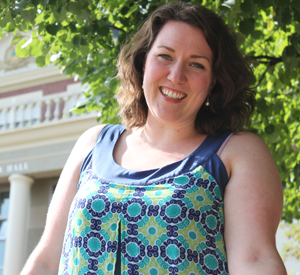
Heather MacDonald, BA ’02, BEd ’10, is in the business of creating stars.
She’s the Learning Strategist at St. Thomas University, and she spends her days helping students master time management and organization, study more effectively, improve reading comprehension, take better notes and avoid procrastination – all the skills required to become an academic star.
Many of the students in her caseload have learning disabilities; however, other students who are accessing her services are student athletes who are trying to balance their studies with their sport, students who want to boost their GPAs, or students who are finding the transition from high school to university overwhelming.
“I try to find ways to make sure that students who experience challenges can have the same great experience at St. Thomas as every other student,” she explained.
MacDonald spends most of her days doing one-on-one consultations and coaching with students, but she also runs workshops, does classroom visits, and plans large campus events like the Long Night Against Procrastination.
“When I got my Education Degree at St. Thomas, I had no idea that my life would be outside the high school classroom, but there are just so many opportunities out there for people to use their skills beyond K-12. What employer wouldn’t want someone who can transmit information to large groups clearly and effectively, plan engaging lessons, assess and evaluate their work and do it in a timely and organized manner? These are the skills of a teacher.”
Although the primary focus in the School of Education is to prepare teacher candidates for work in the traditional K-12 job market, Grant Williams, director of STU’s School of Education, says many education graduates choose to pursue careers in other education-related fields.
“One of the greatest values of the BEd degree for these people is that it helps them understand how individuals learn, what kinds of strategies work best for teaching various subjects and concepts, how to develop effective teaching plans, and how to assess learners’ understanding. In this world of lifelong learning and learning outside of the traditional school setting, many professionals can benefit from the kind of knowledge and experience gained in an education degree”
A Background in Adult Education
Prior to being the Learning Strategist at STU, MacDonald worked in adult education. This is where she discovered her passion for working with adults with learning disabilities.
During her first contract at Stella’s Circle in Newfoundland, she taught a small group of adults a K-6 literacy and numeracy program with the intent that they would go onto the next level of adult education and eventually get their General Education Development (GED) diploma and enter the workforce.
She then returned to Fredericton and taught a GED program with the Central Valley Adult Learning Association.
She says seeing some of the adults she has worked with succeed and get motivated made her realize how powerful learning strategies are.
“I remember one student very well. He had just come out of a correctional facility and for the first time he decided to really focus on his education. We discovered that he had dyslexia and that he also had a short-term retention issue. He had dropped out of school because he thought he wasn’t smart enough. When he was finally diagnosed in his mid-20s, his attitude completely changed and he became voracious about learning even though it took him a little bit longer. And he ended up going on to get a job that supported his family.”
Seeing his transformation made her realize that when people get what they need to succeed, they become unstoppable.
“And if we can apply that to someone who is so young in a university setting, they could be a superstar. Providing students with the opportunity to be the best learner they can be opens up so many doors.”
-(2).jpg)
/filters:format(webp)/prod01/stuca/media/stu/site-assets/images/features/DalCupnews.jpg)
/filters:format(webp)/prod01/stuca/media/stu/site-content/news/DeansListnews.jpg)
/filters:format(webp)/prod01/stuca/media/stu/site-assets/images/features/Internship-Lauren-Feature.jpg)